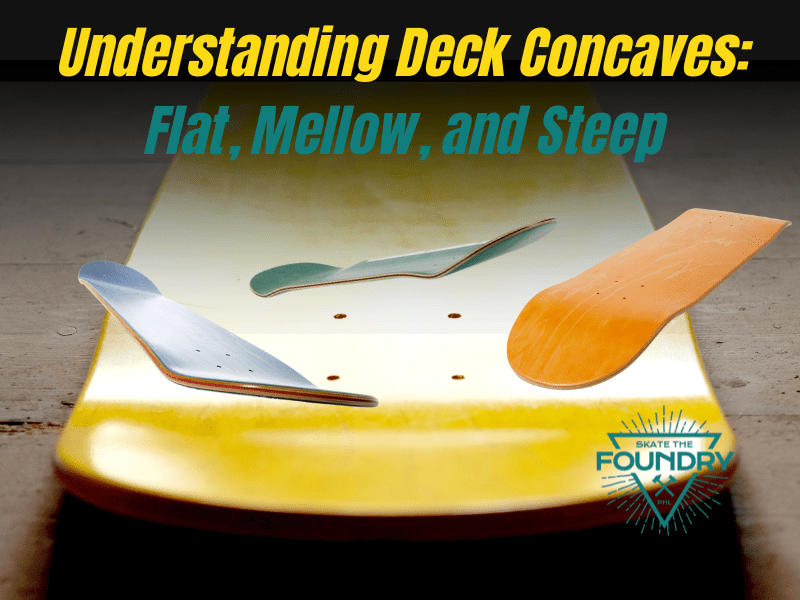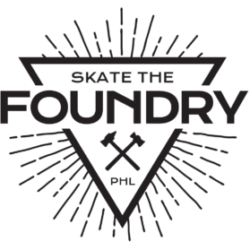Understanding Skateboard Deck Concaves – Flat, Mellow, and Steep

Skateboard decks come in various concave shapes, including flat, mellow, and steep. Each concave shape offers distinct characteristics that cater to different skateboarding styles and preferences. Here’s a detailed look at each type and how they affect your skating experience.
Flat Concaves
Flat concave decks feature minimal curvature across the deck, creating a wide and stable surface area. This type of board is normally seen from riders of Anti-Hero and Creature skateboarders who like flat decks when doing transition skating. This shape offers several benefits and some drawbacks:
Pros:
- Stability and Control: The flat shape provides a broad surface, making it easier to control and balance on the board.
- Comfortable Ride: Particularly beneficial for skaters using vulcanized shoes, flat decks offer a comfortable ride.
- Foot Placement: The flat surface simplifies trick foot placements, making it ideal for transition skateboarders.
Cons:
- Technical Limitations: Flat decks provide less control for technical tricks.
- Flip Tricks: The reduced flick makes flip tricks more challenging. In my personal experience, I have found it harder doing flip tricks on a less concave deck, however there are some flip tricks that are easier when using flat concave decks.
Mellow Concaves
Mellow concave decks have a gentle, slight curvature across the width, offering a balanced mix of control and stability. This type of concave is pretty common for most skateboarders these days and the shape suits a wide range of skating styles.
Pros:
- Balanced Performance: Mellow concaves strike a perfect balance between stability and responsiveness. My personal setup right now, which has a mellow concave, makes it easier for me to skate on certain obstacles especially ledges and pyramids where I noticed it the most.
- Versatility: Suitable for various skating styles, including park, transition, and street skating.
- Flip Tricks: Provides enough flick for flip tricks without requiring excessive effort.
Cons:
- Advanced Technical Tricks: Mellow decks may not offer enough control for highly advanced technical tricks.
- Stability for Cruising: They are not as stable as flat decks for cruising. This explains why you hardly ever see them on downhill skateboards.
Steep Concaves
Steep concave decks feature a pronounced curvature, providing significant control and responsiveness. This is why you’ll see them a lot in the current setups of the world’s top technical skateboarders. This shape is perfect for technical skateboarding.
Pros:
- Technical Control: The steep shape offers excellent control for technical tricks.
- Flip Tricks: Easier to perform flip tricks due to better flick and grip. In my personal experience, I have found nollie and switch tricks to be easier with steep concave decks.
- Trick Lock: Provides better grip and locks for certain tricks, enhancing performance for technical skateboarders.
Cons:
- Beginner Difficulty: Not ideal for beginners due to the steep learning curve.
- Transition Period: Switching from flat or mellow decks to steep concaves can require a significant adjustment period. I spent a few weeks getting used to skating steep concaves. There were a lot of foot placement adjustments I had to make during that time.
Choosing the Right Concave for Your Skateboarding
Every skateboarder has a preferred concave shape that matches their skating style and comfort. Here’s a quick guide to help you decide:
- Flat Concave: Ideal for transition skaters and those seeking stability and easy foot placement. Here’s a few brands that sell flat concave decks, Anti-Hero, Creature and Powell Peralta, just to name a few.
- Mellow Concave: Perfect for versatile skaters who engage in various styles, including park, transition, and street. Majority of skateboard companies have a mellow concave skateboard on their catalog.
- Steep Concave: Best suited for technical skaters focused on advanced tricks and requiring precise control. Here’s a few brands that sell steep concave decks, Plan B, Primitive and Baker Skateboards.
Understanding these differences can help you select the right deck concave to enhance your skateboarding experience. Remember at the end of the day, whether you prioritize stability, versatility, or technical prowess, there’s a concave shape tailored to your needs.
Need Our Assistance? We’re here for you! Just drop us an email with any questions and details about choosing the right skateboard concave, and we’ll help you choose the best one for your style of skateboarding.
